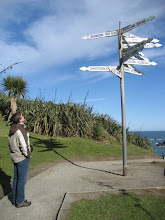This week's Secret Festival involved many meetings. I again weaseled my way to the front of the line with Steven and Dan, Bic, and Diana. I'm envious that Diana will attend Wired News Nextfest 2005. I left to get coffee when the Seattle Channel television camera appeared for "Film Fanatic" Diana .
I was approached by the first friend of buhrger, ironymaiden, thankfully not carrying an embarrassing sign. Later frabjousdave introduced himself as well. After the Festival on Broadway I encountered butterflydrming with ironymaiden. (I hope I don't have their faces and their online identities confused.) Together we all watched...
...a movie I'm still not going to name, even though I know someone who would have liked it. Before the Festival the Seattle Channel was testing those in line to see if anyone would name the film. I doubt anyone did.
2005-06-02
2005-06-01
Watching Red Dust (2005-05-28)
Red Dust uses the subplot of the return of Sarah Barcant (Hilary Swank from the thrilling Insomnia and the improbable The Core) to her South Africa hometown to facilitate the dramatization of amnesty hearings. The plot centers one fictional decision of the Amnesty Committee of the Truth and Reconciliation Commision (TRC) in the late 1990s. The TRC under Archbishop Desmond Tutu eased the transition from apartheid to representative democracy under Nelson Mandela. The hearing in the film involved the interrogation of Alex Mpondo and his friend Steve Sizela, African National Congress (ANC) members, by a local police officer Dirk Hendricks and his supervisor.
Red Dust includes flashbacks to beatings and torture, including wetting a bag placed over the head of the detainee to simulate drowning. When asked why he showed little remorse for his participation in the widespread human rights violations under apartheid, Dirk replies, "It was war." Beatings, indefinite detentions, torture, using war to justify human rights violations--these were part of the crime of apartheid.
It consequently troubles me to contemplate these actions in support of our representative democracy. A Church Report summary includes 71 "substantiated cases of detainee abuse involving 121 victims and six deaths." Department of Defense documents released to the American Civil Liberties Union under the Freedom of Information Act describe placing a bag over the detainee's head and beating him. News articles describe "water-boarding" as a technique the Central Intelligence Agency (CIA) uses for interrogation. This is the same wet-bag technique portrayed in Red Dust. The military requested permission to use this technique, but the Secretary of Defense authorized almost all techniques except this one. Numerous citations are available to those concerned about torture.
What answer will this administration give? "It was war"? South Africa, too, considered itself involved in a war on terror; indefinite detention without trial was permitted under the Terrorism Act No 83 of 1967 (the Act that permitted the arrest of Steve Biko). Such a war does not justify human rights violations.
Red Dust includes flashbacks to beatings and torture, including wetting a bag placed over the head of the detainee to simulate drowning. When asked why he showed little remorse for his participation in the widespread human rights violations under apartheid, Dirk replies, "It was war." Beatings, indefinite detentions, torture, using war to justify human rights violations--these were part of the crime of apartheid.
It consequently troubles me to contemplate these actions in support of our representative democracy. A Church Report summary includes 71 "substantiated cases of detainee abuse involving 121 victims and six deaths." Department of Defense documents released to the American Civil Liberties Union under the Freedom of Information Act describe placing a bag over the detainee's head and beating him. News articles describe "water-boarding" as a technique the Central Intelligence Agency (CIA) uses for interrogation. This is the same wet-bag technique portrayed in Red Dust. The military requested permission to use this technique, but the Secretary of Defense authorized almost all techniques except this one. Numerous citations are available to those concerned about torture.
What answer will this administration give? "It was war"? South Africa, too, considered itself involved in a war on terror; indefinite detention without trial was permitted under the Terrorism Act No 83 of 1967 (the Act that permitted the arrest of Steve Biko). Such a war does not justify human rights violations.
2005-05-30
Watching Ronda Nocturna (2005-05-27)
I liked Ronda Nocturna/Night Watch better when it was over. That is, I like the film's concept, but the telling of the tale took too long, leaving me a little bored.
The film observes the protagonist through one night as he wanders the streets of Buenos Aires. (The film is part of SIFF's "¡Viva Argentina!" program.). It is a gritty city, hit by economic hardship that leaves many of its citizens collecting trash for survival. The protagonist survives by making money as a prostitute and drug dealer.
A small spoiler follows: the SIFF description doesn't mention a word that IMDb's plot keywords includes. That word is "ghost". The film takes place on the «Dia de los Muertos» or "Day of the Dead." Even if only in the protagonist's mind, on this night the boundary blurs between this life and the next, and the marked dead attempt to take their loved ones to join them.
The film observes the protagonist through one night as he wanders the streets of Buenos Aires. (The film is part of SIFF's "¡Viva Argentina!" program.). It is a gritty city, hit by economic hardship that leaves many of its citizens collecting trash for survival. The protagonist survives by making money as a prostitute and drug dealer.
A small spoiler follows: the SIFF description doesn't mention a word that IMDb's plot keywords includes. That word is "ghost". The film takes place on the «Dia de los Muertos» or "Day of the Dead." Even if only in the protagonist's mind, on this night the boundary blurs between this life and the next, and the marked dead attempt to take their loved ones to join them.
Subscribe to:
Comments (Atom)
